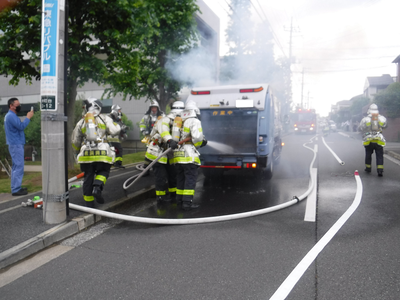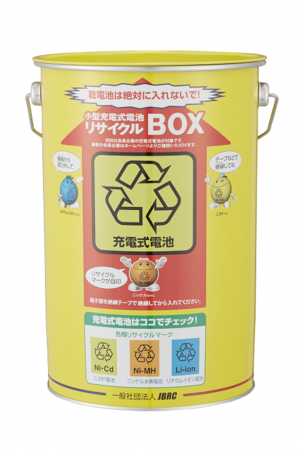- Yokohama-shi Top Page
- Municipal Government Information
- Public Relations, Public Relations, and Public Relations
- Public Relations and Publications
- Public Relations Printed Materials
- Public information Yokohama
- Public information Yokohama-shi version
- Public information Yokohama Plus
- 2023 edition
- February issue Do you throw away dangerous garbage-How to dispose of small household appliances that cannot remove batteries-
The text is from here.
February issue Do you throw away dangerous garbage-How to dispose of small household appliances that cannot remove batteries-
It is time for the new fiscal year to increase the number of people who are moving or cleaning their minds. When cleaning, a lot of garbage comes out. At garbage collection sites, garbage truck fires are increasing recently. We asked the staff in charge of Resources and Waste Recycling Bureau about the current situation of dangerous waste disposal.
Last updated on February 1, 2023.
Increasing number of fires in collection vehicles
―I heard that the number of fires in collection vehicles is increasing, how many cases have been produced?
The fires were caused by lithium-ion batteries (rechargeable batteries), but the fires were four in FY2019, two in FY2020, and six in FY2021, but this year it increased to nine in the six months from April to September. In six months, the situation is higher than last year and two years ago.
―What kind of lithium-ion batteries are used for?
To put it simply, it is used for "small home appliances without code". Originally, small home appliances had cords, such as irons and dryers, and was used by inserting them into outlets. However, in recent years, the number of devices that operate with built-in dry batteries and small lithium-ion batteries has increased. The battery type makes it easier to take out the battery because it replaces the battery, but since lithium-ion batteries are not frequently replaced, there are many things that are difficult to remove from the main unit or cannot be removed.
Examples of small household appliances that use lithium-ion batteries
―What kind of small household appliances can't remove lithium-ion batteries?
These include cordless vacuum cleaners and robot vacuum cleaners, as well as power tools and electric shavers. One of them is a hand-held fan that is often used in summer, but some manufacturers can remove it, so please check the instruction manual.
Examples of small household appliances that cannot remove lithium-ion batteries
―Why does a fire occur if I throw it away with other garbage while the lithium-ion battery is on?
Lithium-ion batteries are at risk of ignition when compressed or exposed to strong impact. In the collection vehicle, waste is compressed inside the vehicle so that it can be collected efficiently, so it seems that lithium-ion batteries built in small household appliances put out in bags with kitchen garbage etc. are subject to pressure and igniting.
Recent lithium-ion batteries are increasing in small but high-power ones, so fires are more likely to occur, and this has become a problem not only in Yokohama City but also nationwide.
―It's hard for the collection truck to burn.
This is a photo of a fire in a collection vehicle in Yokohama City.

Fortunately, smoke was emitted, but in other cities, there were cases where fires were so burning from collection vehicles and scrapped. Also, this is another city, but there are cases where a fire broke out in a pit that stores garbage from an incineration plant, and the incineration of garbage stopped for several months. In both collection vehicles and incineration plants, collection and processing may not be possible if a large fire occurs. A small lithium-ion battery has a major impact on your daily life.
To reduce fire
―What kind of efforts are you taking in Yokohama City to reduce fires?
If you throw away small household appliances that cannot remove the lithium-ion battery into the collection area, we ask you to put them out on burnable garbage Day in a separate bag from kitchen garbage.
In Yokohama City, since October 2022, with the cooperation of Neighborhood Association Neighborhood Associations in the city, we posted the leaflet below on a regional bulletin board. As a result, there were nine fires in the six months from April to September this year, but the number has decreased since October. It is thanks to the citizens who saw the notice divided small household appliances that cannot be removed into separate bags.
If it is in another bag, you can see that the collector is a small household appliance that cannot remove the battery, so it can be transported by putting it in a storage box on the side instead of putting it in the packing box of the collection truck.
Handbill posted on the bulletin board in the city (posting of handbill ended in mid-January 2023)
In one month after posting on the bulletin board, about 450 small household appliances that could not be removed from batteries put out in different bags were discharged throughout the city. Of these, about 30% are vacuum cleaners and cleaning robots, and 10% are electric shavers and e-cigarettes.
―How should I dispose of the lithium-ion battery that could be removed?
Lithium-ion batteries are not collected in Yokohama City because manufacturers are obliged to voluntarily collect and recycle them. Stop cellophane tape or the like at the terminal and insulate it in a "small rechargeable battery recycling box" installed at home electronics retailers and home centers. The yellow can is a landmark. As it is installed in ward office and collection office, please use.

Small rechargeable battery recycling box
Small household appliances that have been removed from the battery should be placed in a bag with kitchen garbage, etc. as burnable garbage and sent to the collection point. In addition, small household appliances less than 30cm x 15cm will be recycled in Yokohama City when they are placed in pink boxes installed at ward offices, etc. The longest side over 50 centimeters is oversized garbage.

―I heard that garbage from mobile batteries used in smartphones and other devices has recently increased.
Because it is sold as a product, it tends to be misunderstood as burnable garbage, but since it is classified as a small rechargeable battery and is not collected in Yokohama City, this is also insulated with cellophane tape etc. and put it in yellow cans at electronics retailers and ward offices.
For information on how to dispose of lithium-ion batteries, etc., please refer to this list.
List of How to Discard (PDF: 419KB)
Frequently Asked Questions
―In addition, what kind of inquiries are often received from citizens?
Inquiries about how to dispose of TVs, air conditioners, washing machines, clothes dryers, and refrigerators and freezers.
These are not collected in Yokohama City because retailers collect them based on the Home Appliance Recycling Law and home appliance manufacturers recycle them. When you buy a new one, you will need to go to the retailer, but if you do not buy a new one but want to throw it away, you will need to pay a recycling fee yourself and dispose of it. Please click here for more information.
How to put out air conditioners, televisions, refrigerators / freezers, washing machines / clothes dryers Yokohama City (yokohama.lg.jp)
Message to citizens
Disposing garbage can lead to a serious accident if you make a mistake. Thank you for your cooperation so that daily collection can be carried out smoothly. In addition, we can perform dispatch lecture/off site lecture etc. on a group-by-group basis about how to dispose of garbage, so please feel free to consult with the collection office in your ward.
If you are lost or in trouble when throwing away garbage, please see here.
Yokohama City (yokohama.lg.jp) to examine the separation of garbage
You may need a separate PDF reader to open a PDF file.
If you do not have it, you can download it free of charge from Adobe.
![]() To download Adobe Acrobat Reader DC
To download Adobe Acrobat Reader DC
Inquiries to this page
Resources and Waste Recycling Bureau Home Affairs Department Business Division (inquiry to this page)
Phone: 045-671-3819
Phone: 045-671-3819
Fax: 045-662-1225
E-Mail address [email protected]
Page ID: 387-821-479







